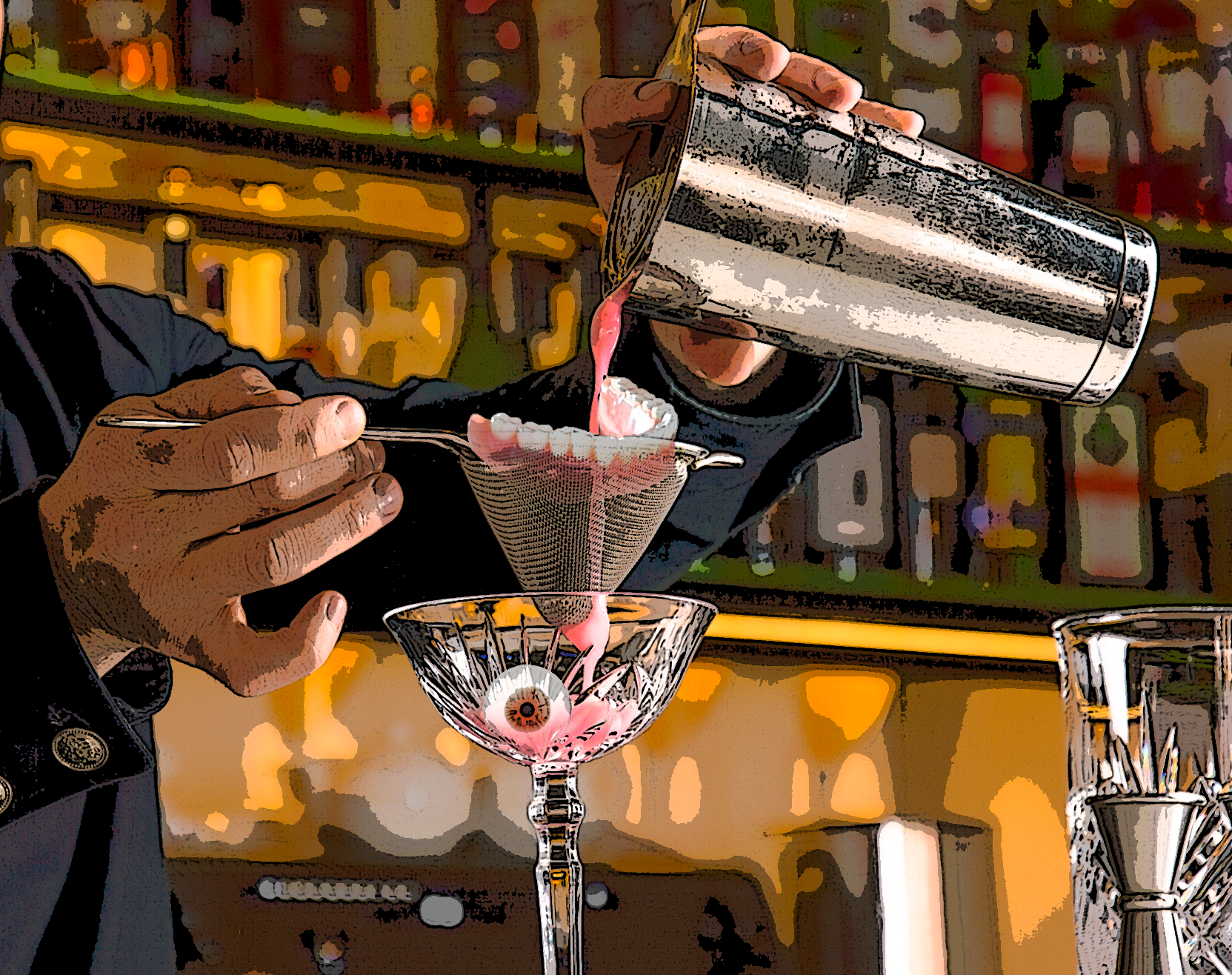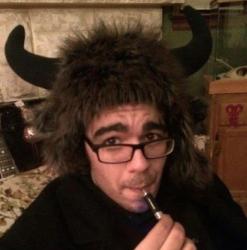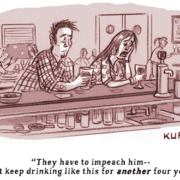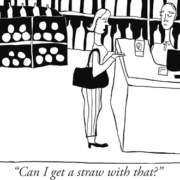Cecil Agnew – The Father Of Modern Mixology
In the 1870s, if you were to walk into Boston’s Wry Donkey saloon to grab a drink, you would be immersed in the charming theatrics of a spunky little barman with an eye patch and an attitude swinging a kielbasa sausage around like a cutlass. “If I cannot bend the will of heaven, I shall move hell!” he’d shout to a crowd of spectators as he swung from a chandelier dropping frozen nuggets made of lead into glasses full of gin and mercury.
Cecil Agnew, “The Optimus Maximus Booze Baby Of Boston,” influenced the American drinking experience for the next one-hundred-fifty years. In an era where cocktails and mixology were in their infancy, Agnew was peerless. He was an innovator and a showman who wrote what many consider the definitive guide to bartending. Papa’s Boozy Tummy Drinks codified and set the standard for mixed drinks and established the bartender as a legitimate vocation at a time when most men of the region considered an honest day’s work to be making mayonnaise for eleven hours a day in the creamy mines of Dorchester.
He provided entertainment and refuge for the townspeople of Boston to forget their troubles for a few hours a night and to sip on the intoxicating spirits of his imagination. The Phoney Baloney, the Petulant Little Pilgrim, and the Fuzzy Nephew were some of the local favorites you may recognize. He even wrote down the first recipe for the Tom Selleck, which was underappreciated in its time but became very popular in the 1980s.
Born in 1842 in the coastal town of Gloucesterbloucesterfloucesterjoucester, Massachusetts, to Benny Agnew, a wealthy oatmealist, and Agnes “Yee-Haw!” Agnew, nee Hans-Gruber, a contemptuous Southern belle who is said to have been the inspiration for the Boss Hogg character from The Dukes Of Hazzard.
As a young boy, Cecil battled severe asthma and chronic leprosy, so he spent most of his time inside his family home, where he grew fond of literature and animal husbandry. As he approached adolescence, his leprosy had dissipated, and his father encouraged the gaunt young man to put childish things aside and take up bare-knuckle boxing. Cecil trained rigorously for years to please his father, eventually becoming the Porkchop County welterweight champion, where he retired with a 32-1 record. His only loss came early in his career after accidentally entering his name into a cockfight where he was pitted against a five-foot-ten, two-hundred-thirty-five pound gamecock named ‘Scufflin’ Dottie. Dottie, at the time, held the record for the largest fighting chicken in Massachusetts. Agnew was given a chance to back out of the fight due to his forty-pound weight disadvantage but feared that doing so would be considered cowardly. So, on September 19, 1873, Agnew vs. Dottie shattered attendance records, and after a heroic effort, Cecil’s corner threw in the towel after losing his eye in the eighty-eighth round. This loss sparked his lifelong prejudice towards combat fowl and other flightless birds.
Rather than be discouraged from his dreams, Cecil used his newfound cyclopean powers to gain the upper hand against opponents. In matches, he’d flip up his eye patch, revealing the gaping aperture where his damaged little peeper once resided. When his challenger recoiled in disgust, he’d use the opportunity to get the drop on them, stomping their foot or kicking them in that really bony part of the shin, making them scream, “Owwie!” Unfortunately, fighters began to build a tolerance for nausea after the great dysentery outbreak of 1874, when nearly every match was ended by some sort of really bad tummy ache. With the advantage of surprise behind him, Cecil retired from boxing.
No longer spending his days having his face rearranged by perverts and transients, Cecil invested in vanity. He spent nearly all of his fight winnings on a really fancy glass eye. After inadvertently dropping it into his nightly snifter of bourbon on a cold winter night, he realized his glass eye was an excellent substitute for ice cubes. His passion for mixology had begun.
He muddled herbs and strychnine with his father’s wooden leg. He zested citrus using his grocer’s hook hand. He strained cocktails with his grandfather’s dentures. When germs were discovered in 1875, he scrapped the use of prosthetics in favor of traditional metal barware. Ever the environmentalist, Cecil chose to use logs of cured meat as swizzle sticks and lead nuggets as whiskey stones.
As news of his eccentric spirits spread throughout Gloucesterbloucesterfloucesterjoucester, Cecil was encouraged to take the plunge into bar ownership. And so, in 1876, the Wry Donkey opened its doors. Throngs of thirsty mayo makers came for the eccentric beverages and, with them, their rowdier counterparts: mustard sappers. While this news was good for business, the thick dust from the mustard quarries wreaked havoc on Cecil’s asthmatic lungs.
One night while attempting to escape the fumes, Cecil crawled atop the bar, knocking over a bottle of turpentine, igniting an inferno after coming into contact with a patron’s lit cigar. To avoid an imminent scorching, Cecil grabbed onto the nearest object he could find: the bar’s chandelier, and as he swung from the sky, the rambunctious bar patrons cheered. “He’s invincible!” one shouted. “He defies the laws of man!” exclaimed another. Cecil waved to the adoring crowd below, yelling ‘“If I cannot bend the will of heaven, I shall move hell!”
A tradition had begun.
It continued for another twenty-five years until his tragic death in 1901 at the age of fifty-nine. The circumstances surrounding his death remain a topic of debate, but he was found dead in an alley behind his bar, apparently beaten to death. According to documents, he was murdered by the jealous husband of a woman he had an affair with. In an account by his close friend and former employee Victor Tinypants, a regular named Howard Livingston had been coming into the bar every night for several weeks. He would sit in the back and just stare at Cecil while peeling an apple with a switchblade. Victor noticed this universal sign of nefarious plotting and approached him to ask if there was a problem. He claimed that Howard looked him in the eyes and said, “I am the jealous husband of a woman he had an affair with, and I am going to beat him to death in the alley behind the bar tonight.”
Victor started to suspect that Howard was angry with Cecil for having an affair with his wife and gave him reason to believe that Howard would murder Cecil in the alley behind the bar later that night. Still, he had no proof, just conjecture, so he just shrugged his shoulders and let Howard finish his apple.
The following day a man called the police after he stumbled onto Cecil’s remains while disposing another body in a separate and unrelated homicide. An autopsy was performed, and it was ruled that the cause of death was severe head trauma, most likely caused by several thousand blows to the head by his beloved kielbasa sausage.
Initially, the police suspected it to be an unfortunate suicide considering he was beloved by the community and had no known enemies. Victor Tinypants, however, still had a weird feeling about the conversation he had with Howard Livingston the night before and reluctantly went to the authorities. The police agreed it was suspicious and sought to bring Howard in for questioning, but he was nowhere to be found. They launched a manhunt that lasted for several days, but during another autopsy on a different body, it was revealed that the body being disposed of in that separate and unrelated homicide coincidentally belonged to Howard Livingston. It was determined that the man who killed Howard Livingston had been stalking him for several weeks while peeling an apple with a switchblade because he was jealous of the fact that he had an affair with his wife.
As news of Cecil Agnew’s death spread across the state of Massachusetts, thousands flocked to the doors of his bar to pay their respects to the man who taught them how to abuse substances. Agnew’s funeral service was conducted on 23 October 1901 at the MOOssachusetts Creamatory, where keeping with family tradition, he was turned to cream and interred at St. Paul Of McCartney Cemetery.
It’s been one hundred and twenty years since his untimely death, but the legacy of Cecil Agnew can’t be understated. You can walk into a bar anywhere in the world and taste a little bit of that portly New Englander on your tongue. Whether you’re puckering your lips after taking a sip of a tangy Tom Selleck or chasing your Fuzzy Nephew with a lemon, you are waving hello to one of the men who shaped the taste of our culture and added flavor to America.













